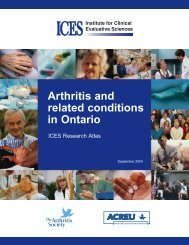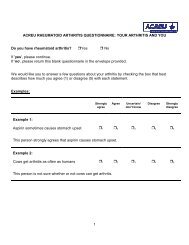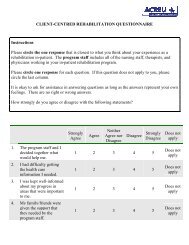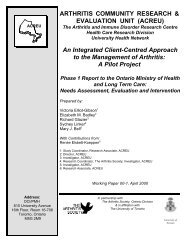Client-Centred Rehabilitation - Arthritis Community Research ...
Client-Centred Rehabilitation - Arthritis Community Research ...
Client-Centred Rehabilitation - Arthritis Community Research ...
Create successful ePaper yourself
Turn your PDF publications into a flip-book with our unique Google optimized e-Paper software.
38<br />
abrupt and left them feeling isolated and<br />
alone.<br />
“But that transition period is not<br />
really a transition. You are just sort<br />
of dropped like a rock and then<br />
you’re out there to fend for yourself<br />
and that’s really hard” ABI #3<br />
“then you’re out the door and you’re<br />
on your own” SCI #3<br />
Many felt that the responsibility of the<br />
service seemed to end once the client was<br />
out the door. The client’s needs post<br />
discharge were often ignored.<br />
“…post discharge needs which don’t<br />
seem to be the mandate of the<br />
institution” SCI #2<br />
“I was never asked once…if I even<br />
needed home care. No one even ever<br />
asked…if I needed any help.”<br />
PTPART #1<br />
“the negative aspect of it was there<br />
was no thought about the day when I<br />
was released about what I needed to<br />
have when I went home” HIPKNEE<br />
This lack of preparation for discharge<br />
contributed to feelings of fear of leaving<br />
hospital.<br />
“before I left I was scared I was<br />
scared to leave. I was telling<br />
everyone- Don’t kick me out! Don’t<br />
kick me out!” COPD #3<br />
“Right before discharge I was<br />
deathly afraid to leave because<br />
everything was set up for me [in<br />
rehab hospital]” SCI #3<br />
Ongoing contact after discharge<br />
A common theme was the need for an<br />
ongoing resource or contact while in the<br />
community. Many clients talked about the<br />
importance of feeling that they had someone<br />
to call to provide advice or support or<br />
further rehabilitation once they were in the<br />
community. For some, this support came<br />
from community organizations such as<br />
disease specific organizations. Others were<br />
affiliated with rehabilitation programs that<br />
provided this ongoing linkage.<br />
“I said yeah I have been waiting<br />
nearly three months. He says you<br />
shouldn’t have done that, you’re a<br />
patient here. When you need us, you<br />
phone. Well I said I didn’t know<br />
that” COPD #1<br />
In order to make the transition between<br />
services better a number of suggestions were<br />
made by the participants. The transition<br />
should:<br />
♦ be appropriate to the post discharge<br />
needs of the client<br />
♦ coordinated by a social worker,<br />
customer service representative, or<br />
case worker<br />
♦ preplanned<br />
♦ discussed by all team members<br />
Help navigating the system<br />
Many participants mentioned the need for<br />
help and direction in navigating the system.<br />
<strong>Client</strong>s would like someone to help with<br />
transitions but often they are left to do this<br />
on their own.<br />
“I would like to see still that the<br />
transition process between care,<br />
between hospitals or what ever it<br />
would be great if I had a case worker








